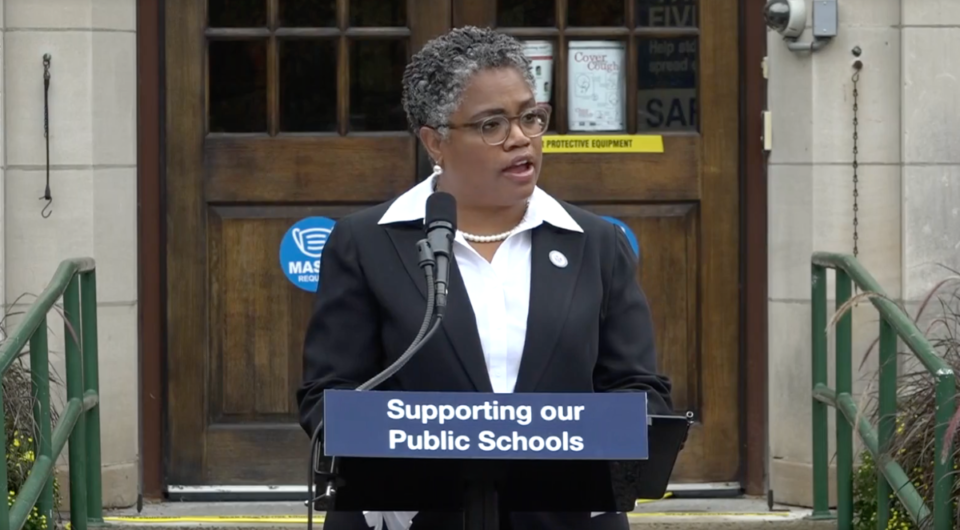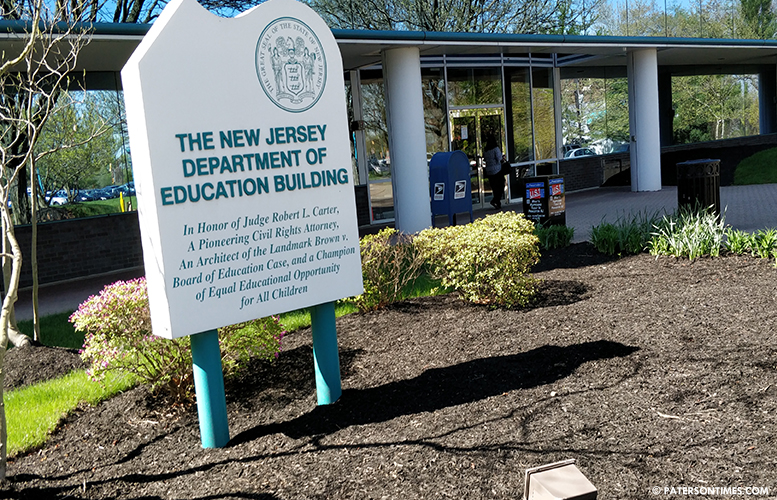
LILLEY: Murphy Is Failing In His Duty To Education New Jersey’s Children
April 12, 2023
Four Tips From Newark’s Great Oaks Legacy To Ensure Student Success in College Admissions
April 12, 2023Murphy’s Commissioner Rules That Districts Can Continue to Hold Special Education Families ‘Hostage’
Two months ago Acting Education Commissioner Angelica Allen-McMillan ruled on a case that has wide implications for students with disabilities and their parents. The ruling was in response to a petition by special education attorney Jamie Epstein, who asked the the Murphy Administration’s Department of Education (DOE) to change state regulations that currently allow school districts to delay due process claims for inordinate amounts of time. In her ruling (copied in full below) she affirms school districts’ practice of unnecessarily delaying parents’ complaints from going forward, subjecting children to long gaps without the support they need.
I asked Mr. Epstein to translate the Commissioner’s ruling, which is weighted down with statutory apparatus. Here’s is his emailed explanation:
“When a parent of the special education child files for due process, their complaint goes to the school and the New Jersey Department of Education. The case against the school cannot be transmitted for a hearing for 30 days if the school does not agree! If the school does not agree to the transmit the parent’s complaint to the DOE, then the school must hold a resolution meeting within 15 days. After the resolution meeting is held, if the school still does not agree then the case against them cannot be transmitted for a hearing until 30 days after the parents complaint was filed with the New Jersey Department of Education.
In other words, the regulation allows the school to unnecessarily delay the parent’s complaint against the school itself from going forward. In this way the New Jersey Department of Education, by its own regulation, knowingly permits a school to hold a parent and their child’s complaint hostage for the full 30 days.
The New Jersey Department of Education’s response to my proposed regulation change is absurd but not unexpected. As per the last paragraph of their denial they say if the resolution meeting fails, the case should not be transmitted because the parents and the school may still resolve their dispute. That makes absolutely no sense: The resolution meeting was the parties’ attempt to resolve their dispute and the resolution meeting failed to resolve their dispute. Yet the school district can still hold the parents complaint against them from being transmitted to the DOE until the 30 days expire.
There is no other type of legal proceeding that I am aware of where the defendant can unilaterally delay the complaint against them from proceeding.
As a result of this loophole in the regulation, the New Jersey Department of Education knowingly allows schools to hold parent complaints hostage and that is exactly what schools do in every case.
What is particularly remarkable here is that there is a long history of parents filing lawsuits against the New Jersey Department of Education for failing to complete special education hearings within the time limits of federal law, which is 75 days from the date of the parent’s complaint. As a matter of fact, there is a federal class-action lawsuit regarding this exact issue that is pending in the District Court in Camden, New Jersey.
Here is the Allen-McMillan’s “Notice of Action on Petition for Rulemaking,” i.e., her ruling on Mr. Epstein’s proposed regulation change:
PUBLIC NOTICE
EDUCATION
STATE BOARD OF EDUCATION
Notice of Action on Petition for Rulemaking
Special Education Program
Commencement of case
Scheduling of hearing by Office of Administrative Law
N.J.A.C. 1:6A-3.1 and 9.1
Special Education
Due Process Hearings
N.J.A.C. 6A:14-2.7
Petitioner: Jamie Epstein, Esq.
Take notice that on February 15, 2023, the New Jersey State Board of Education (State Board) received a petition for rulemaking from the above petitioner, requesting the State Board amend N.J.A.C. 1:6A-3.1 and 9.1 and N.J.A.C. 6A:14-2.7.
N.J.A.C. 1:6A, Special Education Program, governs hearings at the Office of Administrative Law (OAL) that arise out of the special education program of the Department of Education (Department). N.J.A.C. 1:6A-3.1 specifies that the Department’s Office of Special Education Programs (Office) shall immediately transmit cases upon the unsuccessful conclusion of the resolution process or mediation. N.J.A.C. 1:6A-9.1 permits adjournments at the request of a party, requires an adjournment to be for a specific time period, and provides that the adjournment extends the deadline for a decision. N.J.A.C. 1:6A, which is promulgated by the OAL, is the continuation of the process that is utilized by the Department, pursuant to N.J.A.C. 6A:14, which mirrors the Federal requirements under the Individuals with Disabilities Education Act (IDEA).
The petitioner sought to amend N.J.A.C. 1:6A-3.1 and 9.1 to replace “resolution process” with “resolution meeting.” The State Board does not have the authority to amend Title 1 of the New Jersey Administrative Code and, therefore, the parts of the petitioner’s request that relate to N.J.A.C. 1:6A-3.1 and 9.1 are denied as mentioned in the Notice of Receipt and Action on Petition for Rulemaking (see 55 N.J.R. 610(b)).
N.J.A.C. 6A:14-2.7 establishes the rules for due process hearings and resolution meetings when a student’s parent and a district board of education disagree regarding identification, evaluation, reevaluation, classification, or educational placement, the provision of a free, appropriate public education, or disciplinary action. The section relates to students with a disability and students identified as possibly having a disability.
When a parent requests a due process hearing or an expedited due process hearing, N.J.A.C. 6A:14-2.7(h) allows a district board of education to resolve a matter through a resolution meeting before proceeding to a due process hearing. The subsection requires the district board of education to conduct a resolution meeting with the parent and the relevant member(s) of the individualized education program (IEP) team who have specific knowledge of the facts identified in the request.
N.J.A.C. 6A:14-2.7(h)4 requires the Office to transmit the case to the OAL for a due process hearing if a due process hearing request is not resolved to the satisfaction of the parents within 30 days of the receipt of the request.
N.J.A.C. 6A:14-2.7(h)10 requires the parties to notify the Office, in writing, of the result of the resolution meeting. The Office is required to transmit, to the OAL, a matter that is not resolved or withdrawn after 30 days from the date the request was received.
The petitioner sought to amend N.J.A.C. 6A:14-2.7(h)4 to replace “within 30 days of the receipt of the petition” with “at the time of the resolution meeting or at mediation.” The petitioner also sought to amend the paragraph to require the Office to transmit the case “immediately.” The petitioner further sought to amend N.J.A.C. 6A:14-2.7(h)10 to delete the reference to the 30-day deadline.
The petitioner’s request stated that a student is entitled to a final due process decision within 75 days of petition’s filing date. The petition also stated that the existing regulations unnecessarily delay the student’s right to a timely due process decision by requiring the school to consent to the student’s request for transmittal. The petition further stated that the existing regulations allow the school district to unilaterally block a student’s request to transmit the petition and the Department is complacent in unnecessarily delaying the student’s right to a timely final decision.
The regulations at N.J.A.C. 6A:14-2.7 are consistent with the requirements of the IDEA, at 20 U.S.C. § 1415 (f)(1)(B)(ii), and its implementing regulations at 34 C.F.R. § 300.510, which provide for a 30-day resolution period prior to the commencement of a due process hearing before an independent hearing officer. The parties may request transmittal of a case prior to the expiration of the 30-day resolution period by agreeing to waive the resolution meeting altogether or by both parties agreeing, in writing, that no agreement is possible after the start of the mediation or resolution meeting. 34 C.F.R. § 300.510(c) (1), (2). Therefore, mechanisms exist that would permit transmittal of a case before the end of the 30-day resolution period; however, both parties must agree to do so. 34 C.F.R. § 300.510(c) (1), (2).
As the state educational agency, the Department is responsible for ensuring the implementation of the IDEA, which protects the rights afforded to children with disabilities and governs the delivery of special education and related services. The Department is also precluded from adopting State rules that conflict with the provisions of the IDEA or its implementing regulations. The petitioner’s request would result in a conflict between N.J.A.C. 6A:14 and the IDEA and its implementing regulations.
Furthermore, requiring the Office to immediately transmit a matter at the end of a resolution meeting or mediation conference without the agreement of all parties would deprive the parties of the opportunity to further consider what was discussed at the resolution meeting or mediation and possibly reach an agreement that would resolve the matter to the parents’ satisfaction.
For all of the above-mentioned reasons, after due consideration pursuant to law, the petitioner’s request is hereby denied.
_____________________________________________
Angelica Allen-McMillan, Ed.D., Acting Commissioner
Acting Secretary, N.J. State Board of Education




